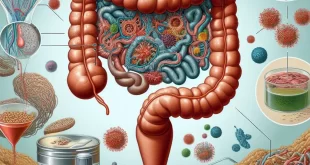The significance of the intestinal microbiome for our health is increasingly acknowledged. Playing a pivotal role in numerous bodily processes, this “second brain” continues to unravel its mysteries, emphasizing the importance of maintaining its health, particularly through our diet.
What is the intestinal microbiome?
Our digestive system hosts over a thousand species of microorganisms, predominantly bacteria and yeasts. This microbiome performs several vital functions, including the digestion of indigestible components and the absorption of nutrients, according to Inserm. It also plays a role in the synthesis of key vitamins for our immunity and in regulating the absorption of minerals such as calcium and magnesium. Moreover, recent studies suggest that the intestinal microbiome could influence our mental health through chemical signals sent to the brain.
Imbalances in the microbiome and associated risks
An imbalance in the microbiome, known as dysbiosis, can contribute to the development of various diseases. However, maintaining a healthy microbiome is possible through simple hygienic and dietary practices.
Preserving the health of the intestinal microbiome
Stress, lack of exercise, poor quality sleep, and an unbalanced diet can all disrupt the microbiome’s balance. Daily actions, such as a short walk after meals, relaxation rituals before sleeping, or practicing meditation, can all have beneficial effects.
Diet, the key to microbiome balance
It is advisable to limit the intake of harmful foods such as saturated fats (found in butter, red meat, and some cheeses), trans fats, omega-6 fats, refined sugars, and ultra-processed foods.
How to enrich your microbiome?
To promote a microbiome rich in good bacteria, experts recommend increasing the intake of fibers or prebiotics, complex carbohydrates, probiotics (found in certain cheeses and fermented foods), polyphenols, omega-3 fatty acids, raw foods, plant proteins, sourdough bread, and beneficial spices like turmeric. These elements contribute not only to digestive health but also to our immune system, enhancing overall well-being.
 medjouel.com Study Non Stop
medjouel.com Study Non Stop



